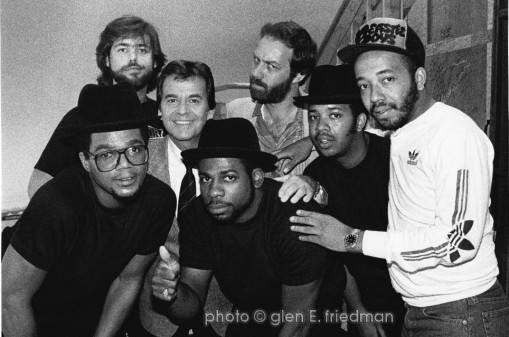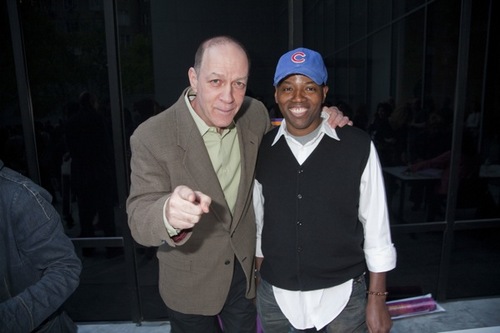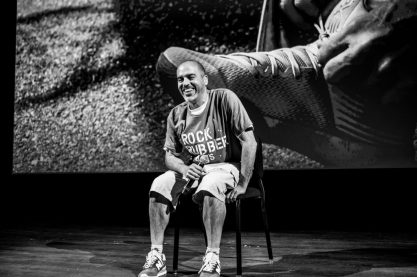Interviews
SOCIAL STUDIES: An Interview with Bill Adler, the founding Director of Publicity at Def Jam Recordings
[caption id="attachment_47579" align="aligncenter" width="509"] (L/R) DMC, Jam Master Jay, Run, Russell Simmons, Dick Clark, Bill Adler, Rick Rubin[/caption]
(L/R) DMC, Jam Master Jay, Run, Russell Simmons, Dick Clark, Bill Adler, Rick Rubin[/caption]
“Def Jam – Tells you who I am” – Chuck D
The beginnings of Def Jam are a legendary part of hip-hop lore: Run out of a tiny, cramped, mess of a New York University dorm by Rick Rubin and Russell Simmons, Def Jam would become more than just a record label. It would become a way of life, the embodiment of the culture it represented.
Legendary in his own right, Bill Adler was the founding director of publicity for Def Jam and Rush Management, responsible for letting the world know about future icons Run DMC, Public Enemy, LL Cool J, the Beastie Boys, Slick Rick and countless others. The efforts of Adler, Simmons, Rubin and others would be vital in building Def Jam and hip-hop into the worldwide phenomenon it is today.
Def Jam Recordings: The First 25 Years of the Last Great Record Label, co-authored by Adler and Dan Charnas, is an amazing oral and visual history of the early days of hip-hop’s most important record label. Bill Adler, the Yoda of hip-hop, was kind enough to sit down with The Couch Sessions and discuss the early days of Def Jam as well as share his great wealth of knowledge about music, media, his dream project, and his advice to young people.
The Couch Sessions: The book, Def Jam Recordings: The First Twenty-five Years of The Last Great Record Label, had to be a lot of work. How long did you work on this project?
Bill Adler: Two years, although I wasn’t the only person working on it. I wrote on the first half, my friend Dan Charnas wrote the second half, and Cey Adams designed it.
The Couch Sessions: Before your time at Def Jam, you worked several music-related jobs. How do you think this prepared you for job at Def Jam?
Bill Adler: My whole life has been defined by a love of music and the ability to write. One way or another, virtually everything that I’ve done since I was 17 years old reflects those two interests and abilities. By the time I started working at Def Jam with Russell, I’d worked as a music journalist for ten years. I’d done very little publicity, but I had spoken to a ton of music publicists and I had an idea about what they did, and I understood that Russell didn’t have anybody doing that for him, so that’s what I volunteered to do for him.
[youtube]http://www.youtube.com/watch?v=_yiBifBmFP4 [/youtube]
The Couch Sessions: Can you describe the early days of Def Jam?
Bill Adler: It was an awful lot of fun. We were a very small, dedicated crew. It kinda felt like we were on a joint mission to do the best that we could for the artists we loved. Happily, we had a lot of success right from the very beginning, so it was pretty exciting.
The Couch Sessions: What was a normal day for you in the office like back then?
Bill Adler: It was always pretty hectic. I worked at the same time for Def Jam and for Rush Artist Management. By the time I started working with Russell, he was already managing Kurtis Blow, Run-DMC, Whodini, Dr. Jekyll and Mr. Hyde, and several other acts, and they all had hits at that time. By ’88, in addition to all the Def Jam artists, we were also working with Big Daddy Kane, De La Soul, Eric B and Rakim and EPMD. I never really had assistant really until ’87, so I had to be a one-man p.r. department. Def Jam/Rush was a wonderful place to work, but things were always popping and there was always more work to do than anybody could reasonably get done in a day.
The Couch Sessions: So what were your hours back then? Because I know Russell was going 24/7.
Bill Adler: Mostly I worked from 9:00 or 9:30 until 6:00 or 6:30 and then I’d go home, and I understood even then that those aren’t very typical music business hours. Certainly, as you say, that’s not how Russell worked. Russell’s schedule is the same today as it was back then; he’d work while the sun was up and then he would go out at night and run from one club to another. It was how he accomplished two things at once: number one, he’s gonna have some fun; number two, he’s gonna be able to conduct business, make new contacts, promote what he wants to promote, and learn about what all else is hot and happening.
But I was already married when I started working with Russ and I didn’t find the nightlife so terribly compelling. I went out with Russell every night for the first two weeks we worked together. At the end of two weeks, I had satisfied myself that Russell himself was invariably the most interesting person that we’d run into in the course of the night. So I just told him, “Look, Russ, I’m gonna come to work tomorrow morning, work all day, then go home to eat dinner with my wife and hang out. The next day I’ll do the same thing all over again.” That way I was able to be close to Russ and learn from him and still have the home life that was important to me.
The Couch Sessions: Back then, did you guys realize you were onto something big?
Bill Adler: Sure…
The Couch Sessions: Did you ever think hip hop would become the worldwide phenomenon it is now?
Bill Adler: If it wasn’t international, it was certainly national right away. Run-DMC were headlining a national arena tour by the end of’84, after which they performed in London to great acclaim….even if Run was unhappy that the French fries at the McDonald’s in London didn’t taste like the French fries at the McDonald’s in Queens. LL Cool J’s first record came out in the fall of 1985 and went gold immediately. In 1986 here comes the Beastie Boys with “Licensed to Ill,” which was gigantic. By the end of ’87, it was triple platinum.
So we had an awful lot of success right away. I always think of it by contrast to the punk rock that came out of New York City only a few years earlier. There were some great and important bands in that movement, but none of them ever sold any records. But our rappers were huge popular and critical successes from the very beginning.
The Couch Sessions: One thing that set Def Jam apart from other labels was the visuals/artwork; the iconic logo, the classic album covers. Obviously, Cey Adams had a lot to do with it…
Bill Adler: He did.
The Couch Sessions: What was the process in coming up with these great visuals?
Bill Adler: Basically, Cey would work as closely as possible with the artist in question and that’s how things got done. Some of the artists were more interested in visuals than others. Chuck D designed the Public Enemy logo. Rick Rubin designed the Def Jam logo. LL, by contrast, didn’t care so very much about the specifics of an album cover; he just thought it was important to have his picture on it.
Glen Friedman, the photographer who shot a lot of the early Def Jam covers, was going to bring his own sensibility to the job. He was never gonna shoot in the studio. He was always going to shoot on location. He was always going to use available light. And he came up with some striking covers: The Great Adventures of Slick Rick, the first two Public Enemy albums, LL Cool J’s “Bigger and Deffer.”
[caption id="attachment_47592" align="aligncenter" width="500"] Bill Adler and Cey Adams (Photo © 2011 Scott Rudd)[/caption]
Bill Adler and Cey Adams (Photo © 2011 Scott Rudd)[/caption]
The Couch Sessions: Describe the differences between Russell Simmons and Rick Rubin. What made this partnership work?
Bill Adler: Well, let’s talk about what they had in common first, namely, a tremendous passion for hip hop culture. Otherwise, their skills were really complementary. Russell had been a record producer, among other things, but what he concentrated on at Def Jam was artist management and promotion. Rick is a record producer and that’s what he concentrated on. And so the combination of those skills worked very, very well for the artists and for the label.
The Couch Sessions: Going back to what you said about Russell and Rick managing artists, they were heads of the label and they also managed the artists on the label. Did this ever cause any problems?
Bill Adler: Oh sure. In the record business it wasn’t unheard of for the same lawyer to represent both parties in a negotiation, the record label and the artist. This is a textbook example of conflict of interest. But I often heard people say -- with a perfectly straight face -- that this state of affairs wasn’t a conflict of interest, but a confluence of interest. A “win-win situation.”
Well, that’s mostly bullshit. I’ll say this; it was a very, very good thing that Russell was able to provide management for the Def Jam artists. It’s so rare for any recording artist to luck out and land a competent, honest, creative artist manager. But the confluence turned to conflict when, for example, the Beastie Boys were mad at Rick Rubin. What were they going to do -- turn to their manager Russell for help? Russell and Rick are partners. That’s a classic conflict of interest right there.
[youtube]http://www.youtube.com/watch?v=tEM3dW2oWW4[/youtube]
The Couch Sessions: Adam Yauch (MCA) recently passed away. Tell me about your first meeting with the Beastie Boys.
Bill Adler: At the very beginning, I didn’t care for them very much. They just seemed kinda sullen and childish to me. And I don’t think they cared very much about me either. I was older. They didn’t know what the hell I did. But we all became pretty good friends, if only because we were thrown into the trenches together. That’s really what the music business is like -- you’re sort of fighting a war and everybody at the label is on the same team. Eventually, I got to like those guys an awful lot, and I think they liked me well enough.
The Couch Sessions: What did you think about the infamous giant inflatable penis that they used on stage during License to Ill tour?
Bill Adler: It was consistent with everything else that they were doing. They were obnoxious, but they hoped that it was comically obnoxious. The Beastie Boys opened up for Madonna in the summer of 1985 and there was no more breathtaking mismatch in the history of rock and roll. Madonna was very pop, very glitzy, super-polished… and the Beastie Boys were deliberately amateurish and vulgar. In retrospect, they were very punk rock. Anyway, we all thought that the mismatch was amusing. But if you were the mother of a twelve-year-old Madonna wannabe in 1985 and you brought her to see Madonna at Madison Square Garden, and all of sudden here come the Beastie Boys to open the show, cursing and grabbing their dicks, you probably were not as amused.
The Couch Sessions: I think that goes along with what Rolling Stone said at the time about Licensed to Ill “three idiots create a masterpiece”
Bill Adler: You know what? People other than the Beastie Boys bought into that notion a little too heavily after a while, because they weren’t idiots. They played idiots onstage, but they were three very bright guys. After the tsunami of “Licensed to Ill” subsided, the Beasties changed up. By the time “Paul’s Boutique” came out in ’89, they’d really matured. They were still about having some fun, but they weren’t as sexist as they had been.
[youtube]http://www.youtube.com/watch?v=-gZmd1aAsGM[/youtube]
The Couch Sessions: There was a time in hip-hop when rappers were proud to be identified with the label they were signed to. Chuck D rhymed: “Def Jam – tells you who I am/You can’t disable the power of my label.”
Bill Adler: Right.
The Couch Sessions: Those are classic lines that inspired a generation of rappers to sign with major labels. What do you think happened to that romance between the rapper and his label?
Bill Adler: Well, it’s not like I have a wonderful grasp of everything that’s being done these days in the world of hip hop. There may be rappers making rhymes in praise of their labels and I don’t know about it. But when I said Def Jam is the last great record label, I wasn’t talking so much about Def Jam’s greatness as I was about the decline of the importance of record labels period. Even leaving Def Jam out of it, there simply will be no more great record labels. You’re a young man, do you own any records?
The Couch Sessions: I still have a couple…
Bill Adler: But you know what I’m saying. They’re not making records any longer and they’re not even making CDs. So the ability to make money selling recorded music has diminished drastically and with it the power and the importance of a record label. So if there are no more love songs to a record label, that’s the reason why. What’s a record label in 2012?
The Couch Sessions: You were with Def Jam from ‘84 to ‘90. Why did you leave?
Bill Adler: Because I wanted a raise and Russell wouldn’t give it to me. Actually, I wanted more than a raise. I wanted a small piece of the company. And he wouldn’t even consider it. So I said, all right, see ya.
The Couch Sessions: Why do you think he wouldn’t consider it? You were vital to the success of the company. You were there from the beginning.
Bill Adler: At the time, I didn’t get it, but I think I may have more insight now. Looking back, 1990 is a low period in the label’s history. The Beastie Boys had left, Rick Rubin had left, the classic line-up of Public Enemy had broken up. Russ was trying to figure out what was next for him, and worrying about me wasn’t at the top of his list. In a couple of years, he’d establish “Def Comedy Jam” and Phat Farm and a whole variety of other ventures. But in 1990, the future of Def Jam was really in doubt and Russell probably thought, “It’s an ever-shrinking pie. I appreciate Bill’s contribution, but I can’t afford to give him a slice of that pie.” That’s probably it in a nutshell.
The Couch Sessions: You’ve gone on to do a variety of things: your own label, an art gallery, documentaries, books, etc., etc. You’ve had a long, successful career. Do you have any regrets?
Bill Adler: I’m not inclined to regret very much. There’s an expression: “Genius does what it must. Talent does what it will.” By that measure, I’m not a genius. I’m not somebody who’s driven to do any one particular thing. I’m somebody who’s got some talent and I can apply it in a variety of different ways. So when I can’t turn one of my little dream projects into reality, I just move on to the next one and try and make that happen. There are very few things that I’ve dreamt up that I must do and if I don’t do it my life is in ruins.
But I will tell you about my favorite current dream project. I’d love to create an Institute for Hip-Hop Studies. It would be both a physical archive and a digital archive comprising recordings, articles, books, photographs, flyers, posters, and advertisements. It would be a magnificent, world-class study center for hip hop. Right now all these materials are sitting in my basement, but I’ve talking to several universities about donating the archives. If ten years go by and I haven’t been able to find a new home for those materials, that is something I’m going to regret.
The Couch Sessions: What do you have coming up next? What are you currently working on?
Bill Adler: I’m working on a book about Public Enemy.
The Couch Sessions: Okay, you have any idea when that’ll be out?
Bill Adler: Well, if I’m lucky and I work hard, I’ll have it out just about a year from now. I’m thinking PE may be nominated for the Rock & Roll Hall of Fame this fall and inducted in the spring of next year. I’d love to have my book finished and in the marketplace by then.
[youtube]http://www.youtube.com/watch?v=WnS53fNfpkE[/youtube]
The Couch Sessions: What words of wisdom would 2012 Bill Adler have for 1984 Bill Adler?
Bill Adler: [Laughs] I don’t know. I turned 60 years old back in December, so I’m a product of the hippie era. What that’s meant in terms of work is that I was never going to take a job simply to pay the rent. I was determined to do work that was meaningful to me. That guided me in 1984 and it guides me now.
I recognize that the economic situation today is very different today than it was 40 years ago – even the shitty jobs are evaporating – but that’s all the more reason to insist on finding some work that makes you happy. Young person, follow your heart.
The “Def Jam Recordings: The First 25 Years of the Last Great Record Label” book is available at Amazon and book stores everywhere.
For more information on Bill Adler, visit his website.
